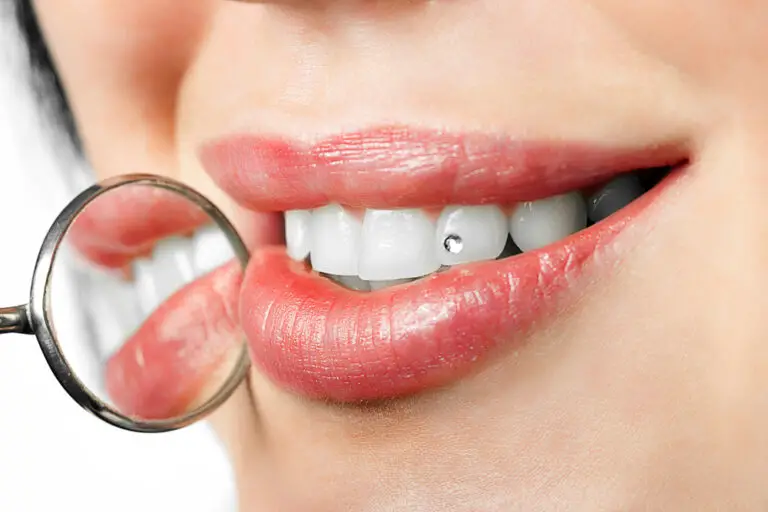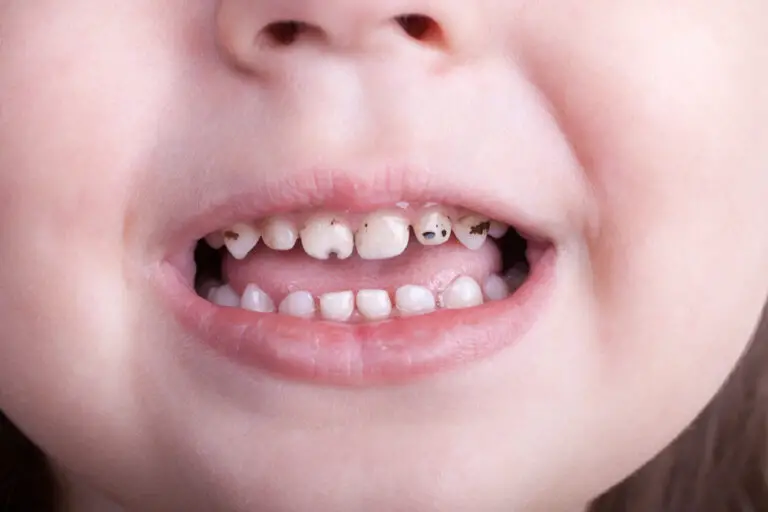Waking up to a mouthful of slimy teeth is an unpleasant experience. As you run your tongue across your teeth, you feel a slippery, almost sticky coating on them. No matter how much you brush or rinse it seems impossible to get rid of that gross slimy sensation.
Having slight plaque buildup that makes your teeth feel temporarily slimy is normal. But excessive and persistent slimy teeth can indicate a problem. This article will cover all the common causes of slimy teeth, when it may signify an underlying health issue, scientific reasons why plaque makes your teeth slimy, and most importantly, how to finally get rid of that annoying slimy feeling for good.
What Causes That Slimy, Slippery Feeling on Teeth?
The main culprit behind slimy teeth is an accumulation of plaque on your teeth. Plaque is a biofilm containing bacteria that builds up on tooth surfaces. As plaque accumulates in larger amounts, it takes on a slimy texture that you can feel with your tongue.
But what causes plaque to build up in the first place? There are several contributing factors:
1. Infrequent Brushing and Flossing
Brushing your teeth twice a day and flossing once daily are imperative for removing debris and plaque from your teeth before it can build up. When you don’t maintain regular brushing and flossing habits, plaque is allowed to continuously accumulate on your teeth unimpeded. This is perhaps the most common reason behind plaque buildup and that resulting slimy feeling.
2. Consuming Sugary Foods and Beverages
The bacteria within plaque thrive when you feed them fermentable carbohydrates like sugar. Foods such as candy, soda, syrupy coffee drinks, and even starchy foods like bread and pasta provide these bacteria with nourishment. This causes them to multiply more rapidly and produce more plaque.
3. A Lack of Saliva Flow
Your saliva helps neutralize acids and wash away bacteria and food debris in your mouth. Conditions like chronic dry mouth, also known as xerostomia, mean there is inadequate saliva present to rinse the bacteria away effectively. This provides an environment where plaque can prosper.
4. Infrequent Dental Cleanings
Even if you brush and floss thoroughly, it is impossible to fully remove all built up tartar on your own. Tartar is plaque that has hardened and bonded to your teeth. A dental hygienist must scrape off tartar above and below the gum line during professional cleanings. Infrequent visits allow more tartar and plaque to accumulate.
5. Changes in Hormones
Hormonal fluctuations, especially in adolescents and women, can increase plaque buildup. The hormones progesterone and estrogen increase inflammation and bleeding of gums, making you more susceptible to plaque.
6. Poor Oral Hygiene Habits
Beyond just skipping brushing, practicing poor oral hygiene habits can worsen plaque buildup. This includes brushing with a worn-out toothbrush, using the improper brushing technique, brushing too aggressively, and sharing toothbrushes.
7. Medical Conditions
Certain medical conditions increase your risk of plaque accumulation and slimy teeth:
- Dry Mouth – Hundreds of medications and chronic health conditions reduce saliva flow, allowing bacteria to multiply faster.
- Diabetes – Those with uncontrolled blood sugar tend to have increased plaque and gum disease.
- Gingivitis – This early form of gum disease causes inflamed, tender gums that bleed easily when brushing.
- Pregnancy – Hormonal changes during pregnancy can worsen gingivitis and plaque. Vomiting from morning sickness also erodes tooth enamel.
- Acid Reflux – Stomach acid entering the mouth promotes plaque production while also eroding tooth enamel.
- Immune Deficiencies – Those with weakened immune systems are prone to increased infections, including periodontal disease.
- Stress & Anxiety – Chronic stress exacerbates inflammation and gum disease. Clenching and grinding from stress wears down tooth enamel.
Why Does Plaque Make Teeth Feel Slimy?
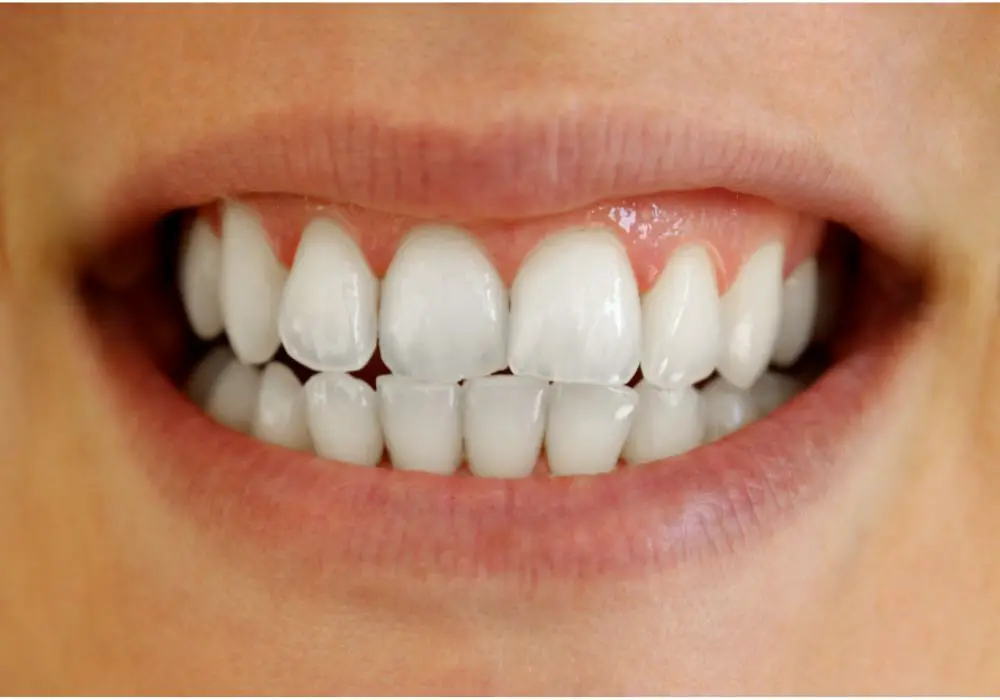
To understand what causes that unpleasant slimy feeling, it helps to examine dental plaque on a microscopic level:
1. Biofilm Containing Bacteria
Plaque is a sticky biofilm containing hundreds of types of bacteria, including Streptococcus mutans. The bacteria adhere to the pellicle, a protein film that coats teeth. The bacteria become embedded in a matrix of polymers they produce to stick to the tooth.
2. Salivary Proteins & Polysaccharides
Plaque also contains salivary proteins, such as proline-rich proteins and mucins. Polysaccharides from your diet are also incorporated. These compounds help the plaque biofilm adhere strongly.
3. Development of Microcolonies
The embedded bacteria multiply and accumulate in concentrated clusters called microcolonies. There are millions of microcolonies within plaque. This complex microbial community thrives on tooth surfaces.
4. EPS Matrix
The microcolonies are held together by a slimy extracellular polymeric substance (EPS) matrix composed of sugars, proteins, nucleic acids. This gives plaque its jelly-like, gooey texture.
5. Acid Production
The bacteria ferment carbohydrates from foods and produce acid as a byproduct. This acid erodes tooth enamel and keeps plaque pH low.
This combination of abundant bacteria, EPS matrix, proteins, and polysaccharides is what creates the slimy feeling as plaque builds up.
Why Does Plaque Buildup Fluctuate?
You may notice your teeth feeling more slimy at certain times or situations. This is because plaque buildup fluctuates based on a variety of factors.
- After eating – Plaque pH drops after consuming foods, especially sugary and starchy items. The bacteria thrive and multiply, increasing plaque.
- Overnight – Saliva production significantly decreases during sleep, allowing more rapid bacteria growth. Morning breath is a sign of the bacteria having a field day in your mouth overnight.
- Stress – Chronic stress and anxiety are proven to worsen plaque buildup and gum disease. Clenching and grinding due to stress also destroys tooth enamel.
- Traveling – It’s easy for oral hygiene to slip while traveling. Not having your usual dental supplies on hand means plaque bacteria can gain ground.
- Illness – Being sick with cold, flu, or other illness can make it difficult to maintain your regular oral routine. This allows plaque to build up.
- Medications – Over 400 prescription and OTC medications cause dry mouth, one of the leading causes of plaque accumulation.
- Diet changes – Increased snacking and consumption of fermentable carbohydrates feeds plaque bacteria encouraging their growth.
The slimy feeling tends to increase when conditions favor unrestrained bacteria growth and plaque production.
How to Get Rid of That Gross Slimy Feeling
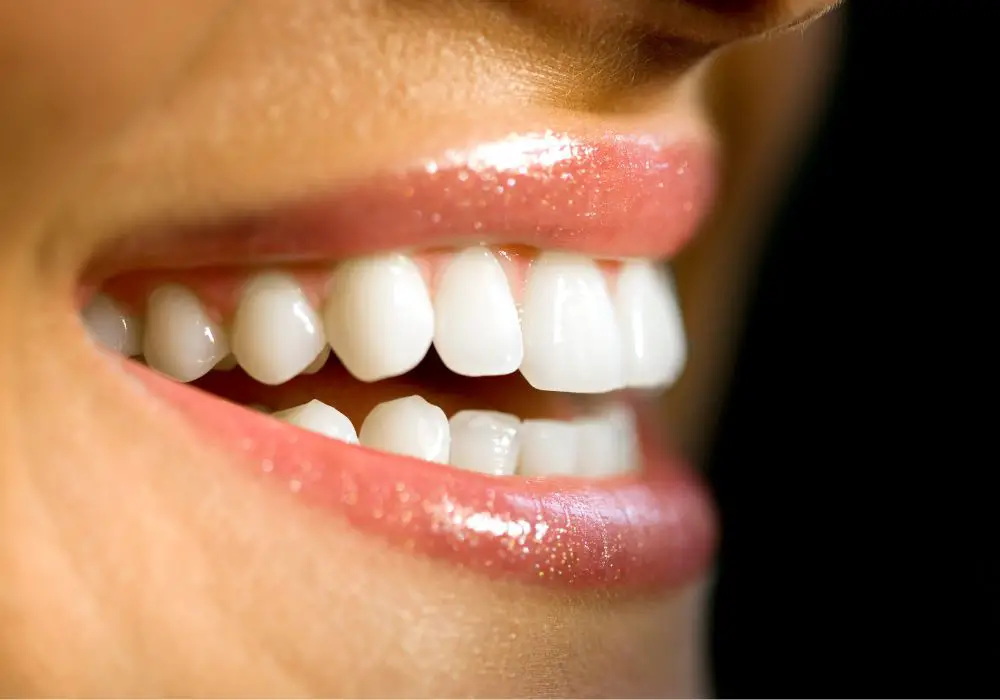
While some temporary plaque buildup is inevitable, excessive plaque that makes your teeth constantly feel slimy is something you want to remedy. Here are 12 tips to get rid of that unpleasant slimy sensation for good:
1. Brush Properly Twice A Day
Use a fluoride toothpaste with a soft bristled brush. Brush for a full 2 minutes each time. Ensure you brush all surfaces – outer, inner, top and tongue side. Set a phone timer if needed.
2. Floss Thoroughly Once A Day
Floss gently between each tooth, going beneath the gumline. Flossing removes plaque hiding between teeth that your brush cannot reach.
3. Swish Daily with Antibacterial Rinse
Use a rinse like Listerine that contains essential oils or cetylpyridinium chloride to help kill lingering bacteria.
4. Scrap Your Tongue
Bacteria and debris collects on the surface of your tongue. Gently scrape your tongue each morning to dislodge buildup.
5. Chew Xylitol Gum
Chewing gum boosts saliva flow after meals, which helps wash away plaque bacteria. Xylitol gum in particular helps reduce cavity-causing bacteria.
6. Drink Water & Avoid Sugar
Stay hydrated and limit sugary drinks. Water neutralizes acids and promotes saliva to keep your mouth cleaner.
7. Eat Teeth-Cleaning Foods
Crunchy produce like apples, carrots and celery help scrub plaque away as you chew while also stimulating saliva.
8. Avoid Frequent Snacking
Continuous snacking provides a constant food source for plaque bacteria encouraging growth. Try to limit snacks to 1-2 times per day.
9. Get Regular Dental Cleanings
A professional cleaning every 6 months removes hardened tartar that you can’t take off at home. Ask about fluoride treatments or prescription toothpaste.
10. Check Medications for Dry Mouth
Ask your pharmacist and doctor if medications you take reduce saliva. Your dentist can recommend treatments for medication-related dry mouth.
11. Use a Humidifier
Sleeping with a humidifier can prevent your mouth from drying out overnight, promoting healthier sleep and better oral health.
12. Manage Health Conditions
Work closely with your doctor to properly manage any medical conditions like diabetes that worsen plaque buildup and gum disease.
While these tips require diligence, they are highly effective at reducing plaque bacteria overgrowth so your teeth feel clean and fresh.
When Should I See A Dentist About Slimy Teeth?

Occasional mild plaque buildup is normal. But if you notice your teeth constantly feeling slimy or any of the following symptoms, it warrants an examination by your dentist:
- White film visibly coating your teeth
- Increased tooth sensitivity
- Swollen, red or bleeding gums
- Receding gums
- Persistent bad breath
- Loose teeth
- Change in tooth color
- Excess saliva or dry mouth
The dentist can identify if your slimy teeth are being caused by a medical condition, infection, or other dental issue needing treatment. Left untreated, excessive plaque can lead to gum disease, tooth decay and tooth loss. It’s best to identify and address the cause sooner rather than later.
Medical Conditions That Cause Slimy Teeth
There are several medical conditions that can contribute to increased plaque buildup and slimy teeth:
1. Dry Mouth (Xerostomia)
Dry mouth is one of the most common causes of plaque accumulation. Saliva helps neutralize acids and cleanse the mouth, so insufficient saliva allows unrestrained bacteria growth.
Over 400 common prescription and OTC medications are known to reduce saliva output, including antihistamines, decongestants, blood pressure medications, antidepressants, muscle relaxants, and antacids.
Chronic health problems like diabetes, HIV/AIDS, autoimmune disease (e.g. Sjogren’s syndrome), nerve damage, and Parkinson’s disease also impair saliva production. Radiation therapy for cancers in the head and neck region can damage salivary glands.
Dry mouth creates an optimal environment for plaque to flourish due to inadequate washing action from saliva. This allows a rapid slimy buildup on teeth.
2. Oral Thrush
Oral thrush is a fungal infection caused by an overgrowth of the yeast Candida albicans in the mouth. It is common in newborns and older adults, as well as those using inhaled corticosteroids or with compromised immune systems.
Thrush causes white lesions and patches that coat the tongue, gums, palate and inner cheeks with a cottage cheese-like appearance. The yeast infection can make your mouth feel dry and slimy or frothy.
3. Gingivitis
Gingivitis is inflammation and bleeding of the gums caused by a bacterial plaque infection. Toxins from plaque bacteria irritate the gums. As gingivitis worsens, it causes tender, swollen and bleeding gums that are more prone to plaque accumulation.
The inflamed gum tissue itself can take on a slimy texture that is apparent when brushing and flossing. If left untreated, gingivitis can advance to periodontitis and damage the tissues and bone supporting teeth.
4. Coated Tongue
A discolored tongue with a thick white or yellowish coating is another common cause of a persistent slimy feeling in the mouth. This tongue coating consists of bacteria, food debris, dead cells and mucus that adheres to the tongue surface.
Causes of a coated tongue include poor oral hygiene, dry mouth, smoking, allergies, and thrush. The rough surface and moisture of the tongue make it a prime spot for this slimy buildup. Gently cleaning your tongue can help resolve a coated tongue.
5. Acid Reflux
Gastroesophageal reflux disease (GERD) or acid reflux allows stomach acid to reflux up and enter the oral cavity. The acidity of this stomach acid irritates the lining of the mouth and promotes plaque production. Acid reflux also gradually erodes tooth enamel over time, allowing more plaque to adhere to teeth.
The combination of erosion and plaque buildup from reflux acid often causes teeth to feel slimy and sensitive. This is especially likely after a reflux episode. Acid reflux can increase the risk of decay and gum disease.
Natural Home Remedies for Slimy Teeth
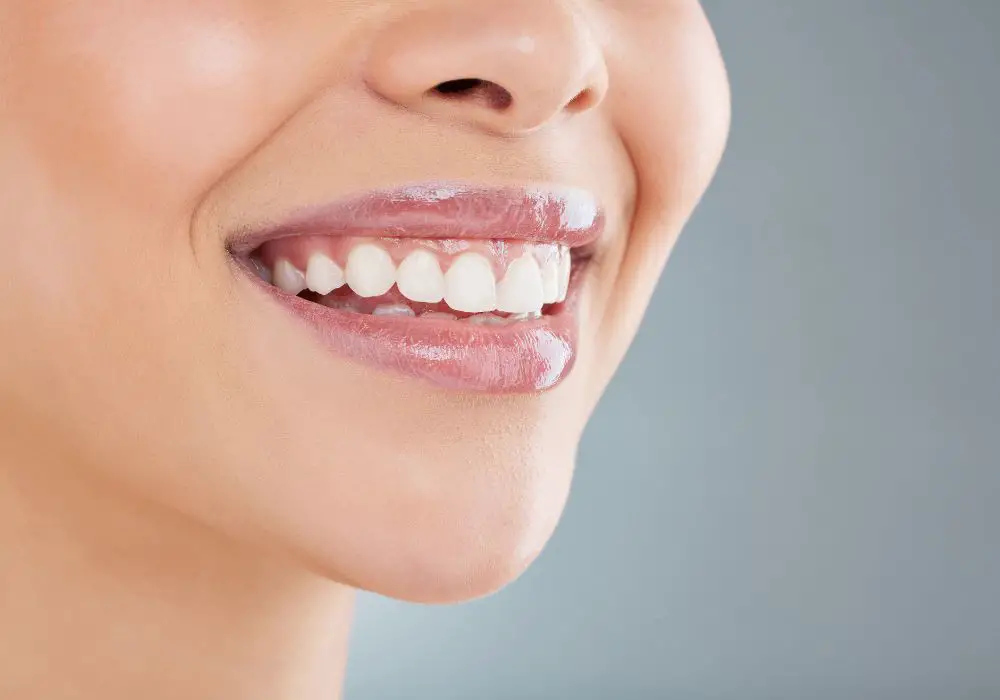
For quick relief when your teeth feel grimy and slimy, these natural home remedies can help rinse away bacteria, break down plaque, and freshen your breath:
- Saltwater rinse – Dissolve 1⁄2 teaspoon sea salt in a cup of warm water and swish for 30 seconds. The salt helps dislodge trapped food particles and draws moisture out of bacteria cells.
- Baking soda scrub – Make a paste with a teaspoon of baking soda and water. Gently scrub teeth with a soft brush. Baking soda has a mild abrasive effect to break down plaque. Rinse thoroughly after.
- Aloe vera gel – The amino acids and antibacterial agents in pure aloe vera gel help kill plaque bacteria. Apply a thin layer and let sit for a minute before rinsing.
- Apple cider vinegar – Swish diluted apple cider vinegar for 30 seconds to help break down plaque and whiten teeth. Start with 1 part vinegar diluted in 3 parts water until you know your enamel can tolerate it.
- Green tea – Swish chilled brewed green tea to help kill bacteria. The plant compounds called catechins have natural antimicrobial effects.
Be sure to wait at least 30 minutes between using acidic remedies and brushing your teeth. The acid temporarily softens enamel, so brushing too soon could damage enamel.
Proper Brushing Technique
While a toothbrush seems simple enough, there are optimal techniques for effectively removing plaque and debris without damaging teeth:
- Use a soft bristle brush: Hard bristles can abrade and scratch enamel. Soft or extra soft is ideal for most.
- Brush at a 45° angle: Point bristles toward your gums rather than straight down to clean along the gumline.
- Use short strokes: Avoid aggressive scrubbing motions which can wear down enamel. Use gentle, short back-and-forth or circular motions.
- Brush every surface: Scrub the outer, inner, chewing surfaces and tongue side of upper and lower teeth.
- Spend extra time on problem zones: Plaque accumulates in crevices and around lower incisors. Take time to thoroughly brush those areas.
- Brush for 2 minutes: Set a timer and brush for the full recommended 2 minutes each session to cover all areas.
- Rinse thoroughly: After brushing, rinse your mouth well with water to dislodge any loose plaque and leftover toothpaste.
Proper technique removes plaque effectively without damaging enamel or gums. Ask your dentist for personalized tips on improving your technique. Regular brushing and flossing using proper methods can make a huge difference in preventing slimy plaque buildup.
When To See A Doctor About Persistent Slimy Teeth
While home care and seeing a dentist are your first steps for addressing slimy teeth, sometimes an underlying systemic health issue is contributing to plaque buildup. Contact your physician promptly if you experience:
- Dry mouth, mouth sores and bad breath that persists despite drinking lots of water
- Pain or difficulty swallowing food or liquids
- Numbness or tingling sensation in your mouth
- Unexplained weight loss
- White or red patches on the gums, tongue or cheeks
- Bleeding, swollen gums that do not improve with brushing and flossing
Schedule an appointment with your doctor if you have any of these symptoms along with slimy teeth. Serious conditions like oral cancer, autoimmune disease, or salivary gland infection could potentially be causing plaque symptoms. It’s essential to seek medical advice so that any condition can be diagnosed and managed properly.
The Takeaway
Having a slimy, gunky feeling on your teeth can seem so frustrating and gross. But armed with the right knowledge, you can combat plaque buildup and achieve persistently cleaner teeth.
The key is identifying the underlying cause – whether it is poor brushing habits, dry mouth, acid reflux or another medical condition. Your dentist and physician can help pinpoint any issues.
Then it comes down to diligence with oral hygiene – brushing thoroughly twice a day, flossing daily, scraping your tongue, getting regular dental cleanings and using natural remedies when you need a quick refreshing clean.
With careful plaque control and treatment of any existing medical conditions, you can finally kiss slimy teeth goodbye!



